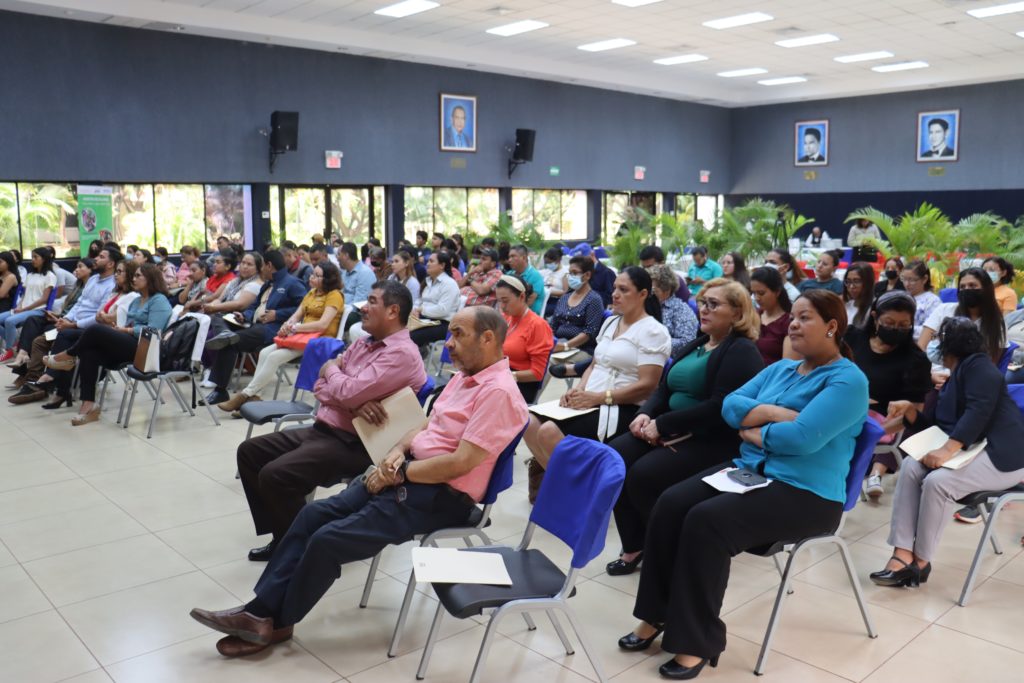Initiative will be aimed at 101 professionals from the Ministry of Education in the country
Paulo Beraldo / Fotos: Enmanuel Castro-FAO Nicaragua
Managua, Nicaragua, May 5, 2023 The Ministry of Education of Nicaragua launched the training “School feeding as a strategy for a healthy life” on May 4. The action has the support of the project Consolidation of School Feeding Programmes in Latin America and the Caribbean, which is developed under the Brazil-FAO International Cooperation Programme.
The objective of the initiative is to increase the technical and methodological training of professionals from the Ministry of Education dedicated to school feeding programmes. The focus is to contribute to the strengthening of this public policy in the country and to promote the generation of healthy habits among the student population.
101 teachers from all over the country participated in the inaugural event in a hybrid format, in addition to members of the Food and Agriculture Organization of the United Nations (FAO) in Nicaragua and representatives of the Brazil-FAO International Cooperation Programme.
School Meals and Comprehensive School Meals Program (PINE)
The course is held in partnership with the National Autonomous University of Nicaragua (UNAN-Managua) and the National Council of Universities (CNU). An effort by the education sector to promote healthy lifestyles. The event had the virtual participation of a delegation from the Brazil-FAO Cooperation, formed by the Brazilian Cooperation Agency of the Ministry of Foreign Affairs and the National Fund for Educational Development of the Ministry of Education (FNDE/MEC).
The Brazil-FAO International Cooperation in school feeding has been carried out since 2009 by ABC/MRE, FNDE/MEC and FAO. Since then, it has worked to strengthen and consolidate school feeding programmes in the LAC region using different methodologies, such as courses and training.
Representing the FNDE, Gilnei Costa, Director of the Board of Educational Actions, reinforced the institution’s commitment to strengthening and consolidating school feeding policies in the countries of the region. He also detailed the trajectory of the National School Feeding Programme (PNAE) in Brazil, which serves 41 million students daily, guaranteeing the human right to food for this population. He also highlighted the importance of regulatory frameworks in Brazil for the institutionalization of this policy, citing the approval of the School Feeding Law in 2009.
Ramona Rodríguez, president of the CNU, said that the course will increase the knowledge and technical and didactic capacities of public servants: “They are fundamental actors for the promotion of healthy habits and lifestyles in the school, family and community environment”.
More than 100 teachers will strengthen their skills in school feeding
“We are delighted to prepare 101 civil servants from the Ministry of Education, including pedagogical advisors for initial, primary and secondary, teachers, national and departmental technicians in school education, directors and deputy directors of departments across the country. And it is also very important to mention the two autonomous regions on the Caribbean coast of Nicaragua,” said Francis Días, Deputy Minister of Education.
The course starts in May and is structured in six virtual modules that will end in August 2023. In addition, it will seek to identify experiences of agroecological development units in schools in the country and promote exchanges of experiences.
The support of Brazil-FAO Cooperation
“The Ministry of Education and its Comprehensive School Feeding Program (PINE) are one of the largest social protection programmes in the country, due to the scope and impact they have on student well-being. This course is very relevant because the people who educate these children will have more knowledge, better teaching tools and skills”, said Iván León, FAO Representative in Nicaragua.
“Everything we do in this cooperation is aiming to support countries to provide a plate of food every day on the students’ table, a concrete basis for guaranteeing the human right to adequate food. Because we know that nobody learns when they are hungry”, said Najla Veloso, coordinator of the Brazil-FAO Cooperation school feeding project.
In 2023, the Brazil-FAO Cooperation is supporting the training of teachers in 11 countries, based on the methodological experience known as Sustainable Schools, which has food and nutrition education actions as one of its six components.
In addition, it is supporting countries to develop strategic actions, which are those activities that can promote the necessary advances in each of the school feeding programmes, such as internal missions, face-to-face events, exchange of experiences, studies, publications and training.
The Brazil-FAO Cooperation has experience in supporting important actions in Nicaragua, especially in the period from 2010 to 2014, generating important contributions to the methodological and technical formulation of the Sustainable Schools strategy, including piloting public purchases for school meals, developing courses and training , elaboration of teaching materials, spaces for dialogue and exchange of national and international experiences. / Content produced by Paulo Beraldo with the support of Enmanuel Castro



